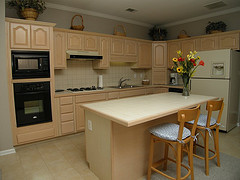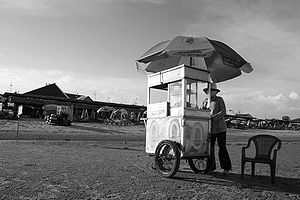When you are selling real estate, there are generally two competing needs that have to be balanced while deciding on a price.
Getting the property sold (low price).
&
Maximizing the price.
It’s a no-brainer that if you price your property at a ridiculously low price, it will sell very quickly. We see some of those amazing deals pop into the MLS… the seller needs to get out of a property immediately and is in a position to be very aggressive with price. Undoubtedly, an investor will swoop in and buy the property if a owner/occupant isn’t fast enough.
On the other hand, it is just as much of a no-brainer that if a property is ridiculously over-priced, it will hang out in the listings long enough to actually be stigmatized. Even with a new MLS number and a new brokerage handling the property, it will have a cloud hanging over as buyers wonder why it has been on the market so long… wondering what must be wrong with it.
And yet… there is almost a mantra from some real estate agents that they will “sell your house for the most money in the least amount of time.” Of course, it is an easy thing to say, and an impossible thing to prove… but just look at the statement for a moment. The least amount of time generally means the least amount of money. And in order to maximize sales price, sellers have to be willing to wait a long time. (Lightning could strike and a cash buyer could drop out of the sky and decide that they HAD to have the property, regardless of price… but not likely).
So, what is a seller to do?
-
Price competitively. No matter what else, the price HAS to compete with the comps in the neighborhood and area. In the unlikely event you can get a buyer to pay a price that is too high, the property will not likely clear an appraisal if the price is too high. Heck, even fairly price properties get clipped by appraisers sometimes.
- Price on a “node”. A node is where multiple price searches might come together. Buyers tend to fall into habits of searching with common boundaries… $100k, $150k, $200k, etc. Instead of pricing like the grocery store ($2.99), price ON the node… $300,000. That way, searches are much more likely to hit your property. This can be tough sometimes… but, the thing to keep in mind is that while it is common, pricing that ends in a $999, $900 or even a $950 should be avoided. End on a round number, and the rounder, the better.
- Know that you may be expected to contribute Closing Costs. This is more true for a $150k home than a $500k home, but many buyers will look to the seller to contribute to closing costs. Bake it into the price, so that it isn’t a shock when the buyer asks for 4-6% to help them with closing.
- Don’t build in fat. Seems to be the opposite of point #3, but it is what it is. Don’t price too high thinking it is “negotiation room”. Buyers are unlikely to offer if they think the price is too high. Instead, offer up your negotiation room up front. Tell the buyer that you are willing to contribute 5% (or whatever) towards their closing costs with a full price offer.
- Level with your Agent. Talk with your real estate agent frankly. Some sellers don’t want to tell their agent what they are willing to do because they assume the agent will use that knowledge to beat them down if they get a buyer. However, with most listing agreements, the seller’s agent actually has a legal duty to look out for the best interests of the seller. Simply put, it is an ethical breach, if not a legal one, for the seller’s agent to betray the interests of the seller.
- Don’t use the agent that tries to “buy your listing.” No, I don’t mean one that puts down cash and offers to buy your property… I’m talking about the agent that comes into the listing presentation with a price that is higher than everybody else’s. They tell you that your house is worth more than it really is… and then usually say that they will “sell your house for the most money in the least amount of time.” They want the listing… and the probably know it won’t sell for the initial offering price. But they are pretty sure they can beat you down on the price later. If not, they just won’t give much effort to selling your house… and mark it up as a loss. Many of these agents are playing a numbers game. If they take 100 over-priced listings, they can get some percentage of them to reduce price and sell. Buy, listings that start off over-priced usually sell for less in the end.
There are a lot of things that sellers have to balance as they go through the process of pricing their homes. It isn’t easy… A good agent can help guide the way, but in the end, the sellers are the ones that have to live with the pricing.
Related articles
- Wayback Wednesday… How Much Earnest Money? (lanebailey.com)
- Wayback Wednesday… Dirty Little Secrets… (lanebailey.com)
- Wayback Wednesday… Buyers and Sellers, Same Advice… (lanebailey.com)



